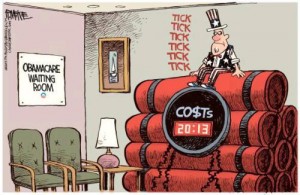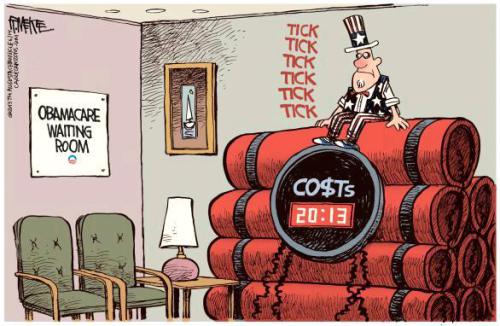by Jonathan S. Tobin • Commentary Magazine
 After a summer of discontent and failure for the Obama administration that is leading into a fall campaign that may cost the Democrats control of the Senate, liberal pundits still have one thing to celebrate. In contrast to predictions from many conservatives last winter, it appears that ObamaCare isn’t an issue that is dominating the midterm elections. But while Democrats are trying to tell themselves that this means the debate about it is over, as even the New York Times conceded in an article today, the controversy over its impact will return with a vengeance next year.
After a summer of discontent and failure for the Obama administration that is leading into a fall campaign that may cost the Democrats control of the Senate, liberal pundits still have one thing to celebrate. In contrast to predictions from many conservatives last winter, it appears that ObamaCare isn’t an issue that is dominating the midterm elections. But while Democrats are trying to tell themselves that this means the debate about it is over, as even the New York Times conceded in an article today, the controversy over its impact will return with a vengeance next year.
As the Times reports, the administration is bracing for the fact that the next open enrollment period may be even more traumatic than the first one. Huge price increases in premiums are expected. As Kevin Counihan, the man recently named to head the federal exchanges, told the newspaper, “Part of me thinks that this year is going to make last year look like the good old days.”
Before the disastrous rollout of the president’s signature health-care legislation began, the assumption on the part of both its advocates and its critics was that once it was put into effect the law would become so popular that it would quickly become unassailable. With that it mind, the president and his team plotted to ensure that the benefits of the plan were to be felt immediately while the costs would not be recognized until much later. Yet when it became clear that the administration couldn’t even set up a website to administer the rollout, it was quickly recognized that assumptions about its popularity were mistaken.
As millions of Americans realized that President Obama’s oft-repeated pledges about people keeping their health care or the doctors if they liked was a lie, the notion of a smooth transition was forgotten. But while the website fiasco undermined confidence in the government and the law, it also served to obscure other more fundamental problems about cost and the law’s impact on jobs and the economy. The website fix and the herding of millions of Americans with no coverage and few choices into the program was represented as a great victory for the president. But the president’s seemingly never-ending touchdown dance about that goal being met may eventually be seen as being as pointless as his boasts about Osama bin Laden’s death heralding the end of the war on terror.
Part of the problem will be the sticker shock many Americans will experience as year two of ObamaCare begins.
Just as there was an uproar when some people found out last year that their policies had been canceled, individuals this year may be surprised to find that they could be asked to pay much more for the same plan because their carrier is raising its prices or the amount of the federal tax credit they will receive is changing.
But the price free-for-all and its impact on the state exchanges that the Times discussed is just the tip of the iceberg.
The only reason ObamaCare stopped being the major issue of 2014 was the tactical decision on the part of the administration to backload all of the really painful aspects of the law. The postponement of the employer mandates effectively limited the impact of ObamaCare this year. But once the requirements start going into effect, some of the long-term problems will start to be felt with a vengeance.
We don’t know yet just how badly the law will impact employment, but it’s clear that it will be serious, as companies will now have an incentive to cut jobs or reduce full-time workers to part-time status in order to avoid the enormous costs imposed upon them by the legislation. This will probably not only increase joblessness but start the process by which increasingly large numbers of Americans will lose their employer health coverage and be driven into the public-sector marketplace.
All this will make the promises made for what was dubbed by the administration as the Affordable Care Act seem even more mendacious. The resulting tumult from the price increases and the dislocation caused by the mandates may not be a story that is as easily told as the one about the malfunctioning website, but the impact will be more damaging.
It remains to be seen just how much of an impact this will have on future elections. There’s no way of knowing whether the pain that is felt in 2015 will last into 2016 and a presidential election in which Hillary Clinton will be trying to avoid the impression that she is running for Obama’s third term. But the main point is that the idea that the discussion about ObamaCare is over is wishful thinking for Democrats. As bad as things looked late last year for the health-care law, they may get a lot worse for the president and his law next year.
. . . . . . . . . . . . . . . .
Jonathan S. Tobin is Senior Online Editor of Commentary magazine with responsibility for managing the editorial content of the website as well as serving as chief politics blogger.
